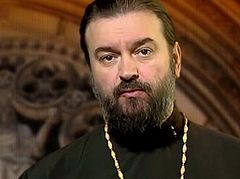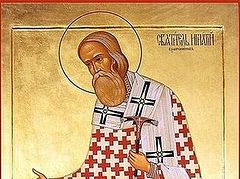Part 1/1: Let us Fast in Earnest
Part 1/2: The Meaning and Significance of Fasting
Part 1/3: Accustoming Ourselves to Fasting
Part 1/4: Spiritual Fasting
Part 2/1: On Prayer. What is Prayer?
Part 2/2: How to Prepare for Prayer?
Part 2/3: How to Pray?
Part 2/4: What to Do After Prayer?
Part 2/5: About the Jesus Prayer
Psalm 83 says: Blessed is the man… who hath made ascents in his heart (v. 6). What is this ascent? In terms of prayer, this is nothing other than gathering your thoughts and senses together and presenting them to God—in prayer. And ecclesiastical books include ways to do this. In the old books, this is called the entrance prayers and the departure prayers, and in our books—the usual beginning.
The entrance prayers are still used today by the Old Believers. They read like this: “O God, cleanse me a sinner! God, be merciful to me a sinner! Thou hast created me, O Lord, have mercy upon me! Countless times have I sinned, O Lord, forgive me! It is truly meet to bless thee, O Theotokos… And the dismissal: Glory to Thee, O Christ our God and our hope, glory to Thee!” and the rest. What is the meaning and significance of this beginning? It can, among other things, serve as an excellent way to gather our thoughts, wandering through various subjects, concentrate them on the incarnate economy of our salvation, and thus plunge our entire sinful existence into the abyss of God’s boundless mercy.
So, the penitential prayers of this beginning, “O God, cleanse me,” and the others remind the attentive reader of the times of the Old Testament, when fallen mankind sighed to Heaven, which was closed to him, for mercy. The hymn of the Theotokos, “It Is Truly Meet,” reminds of the Heavenly door that opened the Kingdom of grace for us by the Incarnation of the Son of God, our Savior. The dismissal, “Glory to Thee, O Christ our God,” points to the salvific time of the New Testament, and causes us to give thanks and glorify the Lord God for granting us salvation. In this way, the entrance prayers gather our scattered thoughts and concentrate them on the incarnate economy of our salvation and prepare us for salvific prayer. It’s used at the beginning of prayers, and the beginning is also read again at the end, though here called the departure prayers; and both the entrance and departure prayers are necessarily accompanied by a prostration.
For us, the beginning of prayer uses the usual beginning, which is: “Blessed is our God;. Glory to Thee, our God; O Heavenly King; Holy God (3x); Glory, both now; O Most Holy Trinity; Lord have mercy (3x); Glory, both now; Our Father.
What is the meaning and significance of this rule? It has a deep meaning and high significance.
A Christian man, as a creation of God by his origin and as a son of God by the grace of redemption, is always obliged to bless his Creator and Savior if he doesn’t want to be an outcast of mankind. And so, following the example of the holy Psalmist, who said of himself: I will bless the Lord at all times, His praise shall continually be in my mouth (Ps. 33:1), he will always, and especially when beginning to pray, call out: “Blessed is our God, both now and ever and unto the ages of ages. Amen.”







